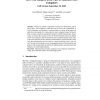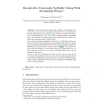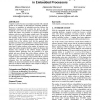10 search results - page 1 / 2 » On E-Vote Integrity in the Case of Malicious Voter Computers |
ESORICS
2010
Springer
13 years 5 months ago
2010
Springer
Norway has started to implement e-voting (over the Internet, and by using voters' own computers) within the next few years. The vulnerability of voter's computers was ide...
CRYPTO
2006
Springer
13 years 8 months ago
2006
Springer
We present the first universally verifiable voting scheme that can be based on a general assumption (existence of a non-interactive commitment scheme). Our scheme is also the first...
ICPR
2004
IEEE
14 years 5 months ago
2004
IEEE
Parallel processors such as SIMD computers have been successfully used in various areas of high performance image and data processing. Due to their characteristics of highly regula...
CASES
2005
ACM
13 years 6 months ago
2005
ACM
Computer security becomes increasingly important with continual growth of the number of interconnected computing platforms. Moreover, as capabilities of embedded processors increa...
CASES
2010
ACM
13 years 2 months ago
2010
ACM
Wired embedded networks must include multicast authentication to prevent masquerade attacks within the network. However, unique constraints for these networks make most existing m...



